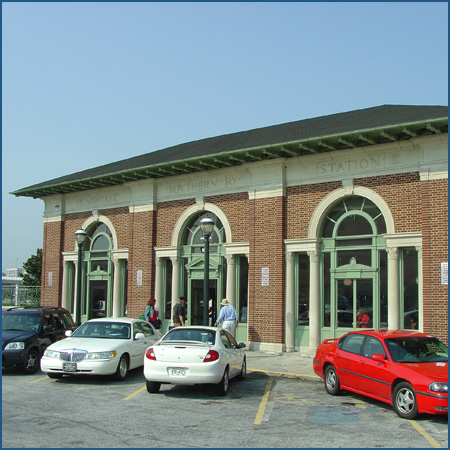Atlanta, GA (ATL)
Standing in the Brookwood Hills neighborhood, the depot was conceived as an Italian Renaissance pavilion. Classical features include pilasters, columns and a prominent entablature.

Peachtree Station
1688 Peachtree Street, NW
Atlanta, GA 30309
Annual Station Ridership (FY 2024): 78,265
- Facility Ownership: Southern Railway A&C Division (NS)
- Parking Lot Ownership: Atlanta Masonic Temple Company, Inc. / Georgia Department of Transportation
- Platform Ownership: Norfolk Southern Railway (NS)
- Track Ownership: Norfolk Southern Railway (NS)
Todd Stennis
Regional Contact
governmentaffairsnol@amtrak.com
For information about Amtrak fares and schedules, please visit Amtrak.com or call 1-800-USA-RAIL (1-800-872-7245).
The current Atlanta station, also called the “Peachtree” or “Brookwood” station, opened on March 17, 1918, and originally served 21 trains daily. The brick depot was designed for the Southern Railway by Neel Reid of Hentz, Reid and Adler, and stands in the Brookwood Hills section of the city, between Buckhead and Midtown. The small building sits over the tracks, typical of a suburban station at the turn of the 20th century. It was added to the National Register of Historic Places in 1976.
The architects conceived of the depot as an Italian Renaissance pavilion. The east façade is composed of three bays separated by four wide brick pilasters with limestone bases. The pilasters are connected by a molded entablature. Flush with the brick facade, the entablature is finished in sections and etched with the name of the station over the bays. Palladian windows and entranceways can be found on every facade except for the western (rear) facade, which includes an attachment that contains clerks’ offices and a sheltered porch area.
Built at a time of widespread segregation, the depot originally had separate waiting rooms and restrooms for use by white and African American passengers. The interior plan also included a ticket office, baggage room and space for a drug store. A door to the left of the ticket window opens to the rear porch and to the stairs that lead to the railroad concourse below.
In preparation for the 1996 Summer Olympics held in Atlanta, the depot received a half-million dollar renovation which included new carpeting, revamped restrooms, a new passenger elevator, interior painting and cleaning of the marble flooring.
Atlanta has also had three Union Stations in succession. The last, built in 1930, stood over the tracks between the Forsyth Street and Spring Street viaducts, and served the Atlantic Coast Line; Nashville, Chattanooga, & St. Louis; Louisville & Nashville; and Georgia Railroad. This building was demolished in the early 1970s. Two earlier Union Stations stood on the block bounded by Central Avenue and Wall, Pryor and Alabama streets. The first, built in 1853, was destroyed by Union troops in 1864. The second, constructed in 1871, was demolished after replacement by the 1930 structure. A parking lot now covers this site.
Atlanta at one time had a Terminal Station downtown, which opened in May 1905. This station and its shed were built for the Atlanta Terminal Company for $1.6 million; the architect was P. Thornton Marye, who also designed Atlanta’s Fox Theater. The train shed was torn down in 1925, and the station itself closed in 1970, to be demolished in 1972. The Richard B. Russell Federal Building now stands on that site.
Atlanta, which began as a railroad terminus, is the seat of Fulton County, though part of the city extends into DeKalb County. On December 21, 1836, the Georgia General Assembly voted to build the Western and Atlantic Railroad to provide a trade route with the Midwestern United States. Following the forced removal of the Cherokee Nation between 1838 and 1839, the depopulated area was opened up for settlement and railroad construction. This eastern railroad terminus, originally called “Marthasville,” was eventually renamed to “Atlantica-Pacifica” by the Georgia Railroad’s chief engineer, and that was shortened to “Atlanta.” The residents approving, the town was incorporated as Atlanta on December 29, 1847.
Railroads continued to be built through Atlanta, and during the American Civil War, the city served as a major railroad and military supply hub in the southeast. The area now covered by the city was the scene of a number of battles, including the Battle of Peachtree Creek, the Battle of Atlanta, and the Battle of Ezra Church. On September 1, 1864, Confederate General John Bell Hood evacuated Atlanta after a four-month siege by Union General William T. Sherman, who ordered all public buildings and possible Confederate assets burned. The next day, the mayor surrendered the city, and on September 7, Sherman evacuated the civilian population. On November 11, he ordered Atlanta burned to the ground in preparation for his march south toward Savannah, though he spared the city’s churches and hospitals.
Reconstruction was gradual, between 1867 and 1888, together with the establishment of a number of schools and freedmen’s aid organizations. In 1868, Atlanta became the state capital, as well. When it set about rebuilding, Atlanta chose the phoenix as its symbol and the railroad was revived in full force, this time transporting a locally invented product called Coca-Cola. Today, Coca-Cola is still headquartered in the City. On December 15, 1939, Atlanta hosted the premiere of Gone With the Wind, the movie based on Atlanta-born Margaret Mitchell’s best-selling novel. A young Martin Luther King, Jr. sang in a boy’s choir from his father’s church, Ebenezer Baptist, also at this time.
In the 20th century, Atlanta has been one of the fastest-growing metropolitan areas in the western world, and is now a city of international influence, as well as the financial and commercial capital of the Southeast. Atlanta is the headquarters for a number of Fortune 500 companies and also boasts more than 30 institutions of higher education, including the Georgia Institute of Technology, one of the top public universities in the nation.
Station Building (with waiting room)
Features
- ATM not available
- Elevator
- Payphones
- No Quik-Trak kiosks
- Restrooms
- Ticket sales office
- Unaccompanied child travel allowed
- Vending machines
- No WiFi
- Arrive at least 60 minutes prior to departure if you're checking baggage or need ticketing/passenger assistance
- Arrive at least 30 minutes prior to departure if you're not checking baggage or don't need assistance
Baggage
- Amtrak Express shipping not available
- Checked baggage service available
- Checked baggage storage available
- Bike boxes for sale
- Baggage carts available
- Ski bags for sale
- Bag storage
- Shipping Boxes for sale
- Baggage assistance provided by Ticket Agents upon request -90mins prior to departure
Parking
- Same-day parking is available; fees may apply
- Overnight parking is available; fees may apply
Accessibility
- Payphones
- Accessible platform
- No accessible restrooms
- Accessible ticket office
- Accessible waiting room
- Accessible water fountain
- Same-day, accessible parking is available; fees may apply
- Overnight, accessible parking is available; fees may apply
- No high platform
- Wheelchair available
- Wheelchair lift available
Hours
Station Waiting Room Hours
| Mon | 07:30 am - 03:00 pm 06:00 pm - 11:59 pm |
| Tue | 07:30 am - 03:00 pm 06:00 pm - 11:59 pm |
| Wed | 07:30 am - 03:00 pm 06:00 pm - 11:59 pm |
| Thu | 07:30 am - 03:00 pm 06:00 pm - 11:59 pm |
| Fri | 07:30 am - 03:00 pm 06:00 pm - 11:59 pm |
| Sat | 07:30 am - 03:00 pm 06:00 pm - 11:59 pm |
| Sun | 07:30 am - 03:00 pm 06:00 pm - 11:59 pm |
Ticket Office Hours
| Mon | 07:30 am - 03:00 pm 06:00 pm - 11:59 pm |
| Tue | 07:30 am - 03:00 pm 06:00 pm - 11:59 pm |
| Wed | 07:30 am - 03:00 pm 06:00 pm - 11:59 pm |
| Thu | 07:30 am - 03:00 pm 06:00 pm - 11:59 pm |
| Fri | 07:30 am - 03:00 pm 06:00 pm - 11:59 pm |
| Sat | 07:30 am - 03:00 pm 06:00 pm - 11:59 pm |
| Sun | 07:30 am - 03:00 pm 06:00 pm - 11:59 pm |
Passenger Assistance Hours
| Mon | 07:30 am - 03:00 pm 06:00 pm - 11:59 pm |
| Tue | 07:30 am - 03:00 pm 06:00 pm - 11:59 pm |
| Wed | 07:30 am - 03:00 pm 06:00 pm - 11:59 pm |
| Thu | 07:30 am - 03:00 pm 06:00 pm - 11:59 pm |
| Fri | 07:30 am - 03:00 pm 06:00 pm - 11:59 pm |
| Sat | 07:30 am - 03:00 pm 06:00 pm - 11:59 pm |
| Sun | 07:30 am - 03:00 pm 06:00 pm - 11:59 pm |
Checked Baggage Service
| Mon | 07:30 am - 03:00 pm 06:00 pm - 11:59 pm |
| Tue | 07:30 am - 03:00 pm 06:00 pm - 11:59 pm |
| Wed | 07:30 am - 03:00 pm 06:00 pm - 11:59 pm |
| Thu | 07:30 am - 03:00 pm 06:00 pm - 11:59 pm |
| Fri | 07:30 am - 03:00 pm 06:00 pm - 11:59 pm |
| Sat | 07:30 am - 03:00 pm 06:00 pm - 11:59 pm |
| Sun | 07:30 am - 03:00 pm 06:00 pm - 11:59 pm |
Parking Hours
| Mon | 07:30 am - 03:00 pm 06:00 pm - 11:59 pm |
| Tue | 07:30 am - 03:00 pm 06:00 pm - 11:59 pm |
| Wed | 07:30 am - 03:00 pm 06:00 pm - 11:59 pm |
| Thu | 07:30 am - 03:00 pm 06:00 pm - 11:59 pm |
| Fri | 07:30 am - 03:00 pm 06:00 pm - 11:59 pm |
| Sat | 07:30 am - 03:00 pm 06:00 pm - 11:59 pm |
| Sun | 07:30 am - 03:00 pm 06:00 pm - 11:59 pm |
Quik-Track Kiosk Hours
Lounge Hours
Amtrak Express Hours
| Mon | CLOSED |
| Tue | CLOSED |
| Wed | CLOSED |
| Thu | CLOSED |
| Fri | CLOSED |
| Sat | CLOSED |
| Sun | CLOSED |


 Amtrak established the Great American Stations Project in 2006 to educate communities on the benefits of redeveloping train stations, offer tools to community leaders to preserve their stations, and provide the appropriate Amtrak resources.
Amtrak established the Great American Stations Project in 2006 to educate communities on the benefits of redeveloping train stations, offer tools to community leaders to preserve their stations, and provide the appropriate Amtrak resources. Amtrak is seizing a once-in-a-lifetime opportunity to transform rail and Retrain Travel. By modernizing, enhancing and expanding trains, stations and infrastructure, Amtrak is meeting the rising demand for train travel. Amtrak offers unforgettable experiences to more than 500 destinations across 46 states and parts of Canada. Learn more at
Amtrak is seizing a once-in-a-lifetime opportunity to transform rail and Retrain Travel. By modernizing, enhancing and expanding trains, stations and infrastructure, Amtrak is meeting the rising demand for train travel. Amtrak offers unforgettable experiences to more than 500 destinations across 46 states and parts of Canada. Learn more at